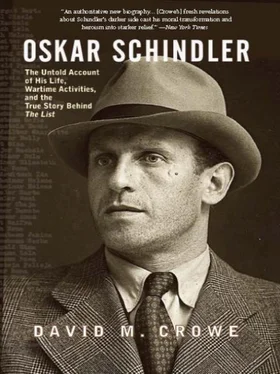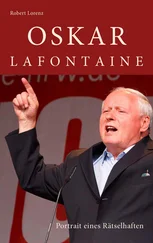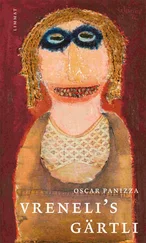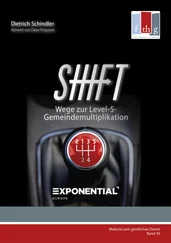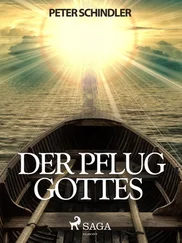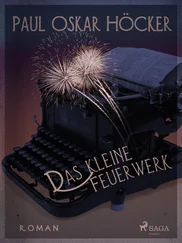Canaris’s liaison with Henlein was Major (Major) Helmut “Muffel” Groscurth, the head of Untergruppe IS (a subgroup of Abwehr I). At this time, Abwehr was divided into three major sections, Abwehr I (secret intelligence service); Abwehr II (cipher and radio monitoring); and Abwehr III (counterintelligence), which was responsible for war sabotage and minorities abroad. 66Abwehr underwent several changes while Oskar Schindler was connected with the organization. In 1935, Hitler’s decision to reinstate universal military service meant, at least from Canaris’s perspective, new dangers to Germany’s military security from abroad. To deal with this threat, Canaris greatly expanded Abwehr III. One of its new subsections was Abwehr IIIF, under Lt. Commander Richard Protze. One of the responsibilities of Protze’s group was to recruit foreigners from across the German border to work for Abwehr. Soon after Canaris took over Abwehr, he decided to become more aggressive outside Germany. Each Abwehr office (Abwehrstelle) in Germany’s nine (later thirteen) military districts was to set up its own intelligence operations team. Each unit of three to six agents was known as a Private Orchestra (Hauskapelle) overseen by a conductor (Kapellmeister). One of the prime tasks of the Hauskapellen was to recruit agents who could infiltrate foreign spy agencies. They were aided by a special group of informants who were part of a Hotelorganisation. These informants worked in hotels and resorts and watched foreign spies. They also helped identify foreigners who might be willing to work for Canaris’s organization. Abwehr IIIF agents at regional border stations worked with the green-uniformed border police (Grenzpolizei) to try to convince foreigners to work for military counterintelligence. 67
Oskar Schindler probably worked for Abwehr IIIF in Opava first under Major Plathe. Gestapo reports in 1940 about a break-in at Schindler’s apartment in Märisch Ostrau in 1939 show that Major Plathe remained Oskar’s command officer through 1940. 68Nothing in the German or Czech secret police files verifies this save for a statement Oskar made to the Czech secret police on July 23, 1938. The inclusion of this in Dr. Sobotka’s official report five days later suggests that he accepted Schindler’s statement as fact. In discussing his initial contacts with a Sudeten German Abwehr agent, whom Oskar referred to as “Kreuziger,” he said that “Kreuziger” told him “to refuse cooperation with the department [Abwehr] II A, which deals only with political issues, such as propaganda, pamphlets, etc.” This reference was not to the old Abwehr II, which had been responsible for cipher (code) and radio monitoring, but to a brand-new Abwehr II. Earlier that year, Canaris had reorganized Abwehr in response to new changes in OKW ( Oberkommando der Wehrmacht ; Wehrmacht High Command) under General Wilhelm Keitel. Abwehr now became the Bureau Abwehr ( Amtsgruppe A), complete with a Foreign Office, an administrative Central Division, and three branches. Abwehr I remained the secret intelligence service, and Abwehr II, now under Groscurth, was responsible for psychological warfare, international agitation, and the cultivation of fifth columns abroad. Abwehr IIA referred to the Central Office in Berlin under Groscurth. 69
There are four major accounts and collections about Oskar Schindler’s work for Abwehr. The first was his own testimony to the Czechoslovak secret police after his arrest in Svitavy on July 18, 1938. The second is the interrogation statement of Leo Pruscha, a Sudeten German whom Oskar had recruited to work for Abwehr. The Czechs arrested Pruscha on July 19. The third document on Oskar’s Abwehr activities is the report signed by Dr. Sobotka for the Police Directorate in Brno, where criminal charges were prepared against Schindler and Pruscha. Emilie also gives some important details about Oskar’s Abwehr work in her memoirs, particularly his activities against Poland in 1939. Some minor interrogation reports by the Czech secret police in the summer of 1938 also allude to Schindler’s activities.
I also discovered in Brno a fifty-five-page collection of Gestapo reports on the break-in at Oskar and Emilie’s apartment in 1939. The investigation, which took over a year, provides some interesting insights into Oskar’s Abwehr activities in 1939 and 1940. Finally, a collection of testimony gathered by the Czechoslovak Ministry of the Interior and the Czechoslovak Governmental Commission for Persecution of Nazi War Criminals after World War II presents important testimonies and information on Schindler. One can piece together a fairly clear picture of Oskar’s work for Abwehr in 1938 and 1939 from these accounts. However, some of the statements, particularly Oskar’s, have to be taken less seriously because he was charged with espionage and faced the death penalty. Certainly he did everything possible to downplay his role as an Abwehr agent. He always minimized his Abwehr activities, particularly after World War II, because he was still under investigation for espionage and war crimes in Czechoslovakia and Poland. The most accurate account is probably that of Leo Pruscha. His testimony about his relationship with Oskar is amazingly honest. He readily admitted to working for Oskar because of his deep sense of Sudeten German nationalism. Pruscha said he worked for the Germans because he was a patriot, though he certainly did not shy away from taking money for his efforts.
Dr. Sobotka’s final report indicates that the Czechoslovak secret police had been watching Oskar for some time and had a dossier on him. It is doubtful that they could have come up with detailed information about many personal aspects of Oskar’s life in just ten days after his arrest. What is remarkable about Dr. Sobotka’s report is how accurately it characterizes Oskar’s motives, needs, and personal characteristics. Czechoslovak police officials were aware of his human weaknesses and strengths well before he arrived in Kraków in the early days of World War II. The act that led to Oskar’s arrest in the summer of 1938 was his effort to get Pruscha, a ticket clerk for the Czechoslovak national railways in Brno, to obtain military and rail information vital to the Wehrmacht’s preparations for an invasion of Czechoslovakia in the fall of 1938.
A year earlier, Czechoslovakia had become the prime topic of discussion among Germany’s military planners. From 1935 to 1937, Czechoslovakia was a favorite target of Hitler’s propaganda machine, which depicted the country as a “tool” of Soviet foreign policy. The Führer now began to explore several options for Czechoslovakia, the boldest being its conquest; Hitler thought conquest would shorten Germany’s borders and provide the Third Reich with a larger German population, particularly after the hated Czechoslovaks had been driven out. Hitler hoped to isolate Czechoslovakia from its European allies, particularly from France and Great Britain, by severing diplomatic relations and emphasizing the “grievances” of the Sudeten Germans. 70
The issue was pushed along by the growing radicalization of the Sudeten German population in Czechoslovakia, particularly after Hitler occupied Austria (the Anschluss, or union) on March 13, 1938. Many Sudeten Germans were certain that Hitler would make them a part of the Third Reich on his birthday, April 20. Henlein’s greatest rival in the SdP, Karl Hermann Frank, who had excellent ties to Himmler and the SS, was certain that Hitler would soon annex the Sudetenland and make it a part of the Third Reich. Many around Frank in the SdP supported this dream. 71
By the fall of 1937, with a severely weakened political base, Henlein wrote to Hitler and proposed the German annexation of Bohemia and Moravia. 72Hitler later told the Sudeten Nazi leader that his tactic in Czechoslovakia should be to make demands that “are unacceptable to the Czech government.” He added that he “intended to settle the Sudeten German problem in the not-too-distant future.” Hitler also told Henlein, “From tomorrow you’ll be my Viceroy [Staathalter]. I will not tolerate difficulties being made for you by any department whatsoever within the Reich.” These words meant a lot to Henlein because also present at the three-hour meeting were Karl Hermann Frank, Rudolf Hess, Hitler’s deputy Führer, Joachim von Ribbentrop, Germany’s foreign minister, and Werner Lorenz, head of the VoMi. 73
Читать дальше
